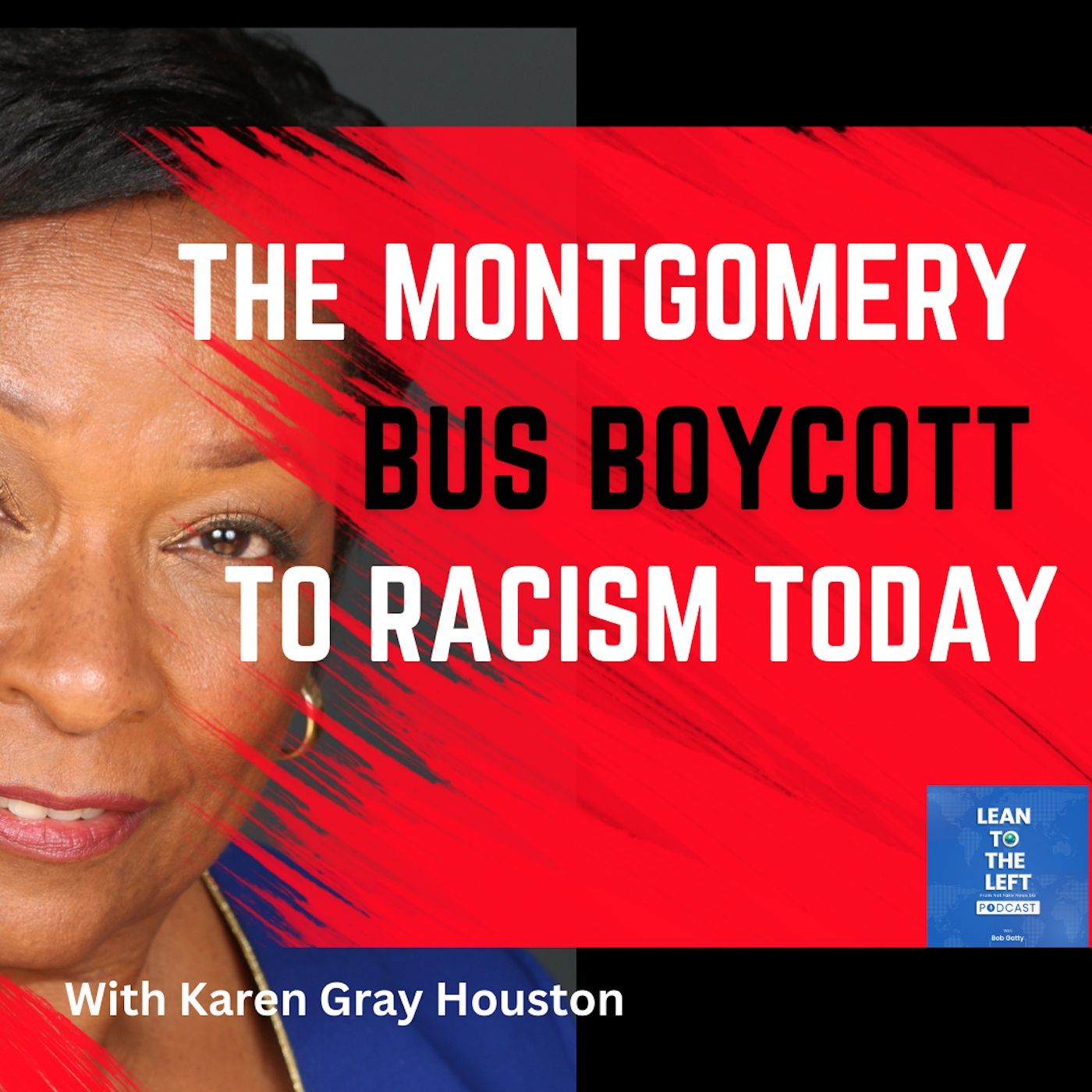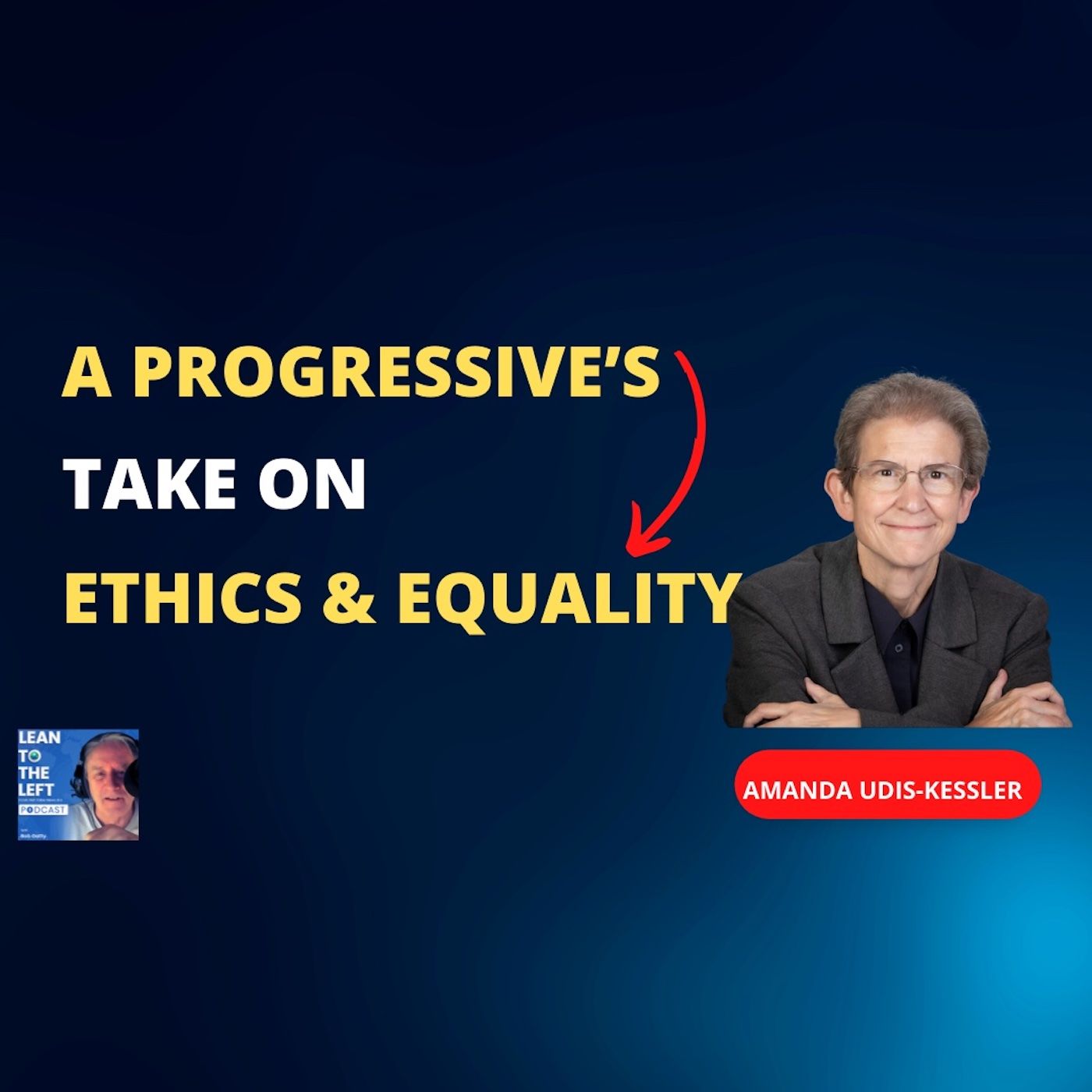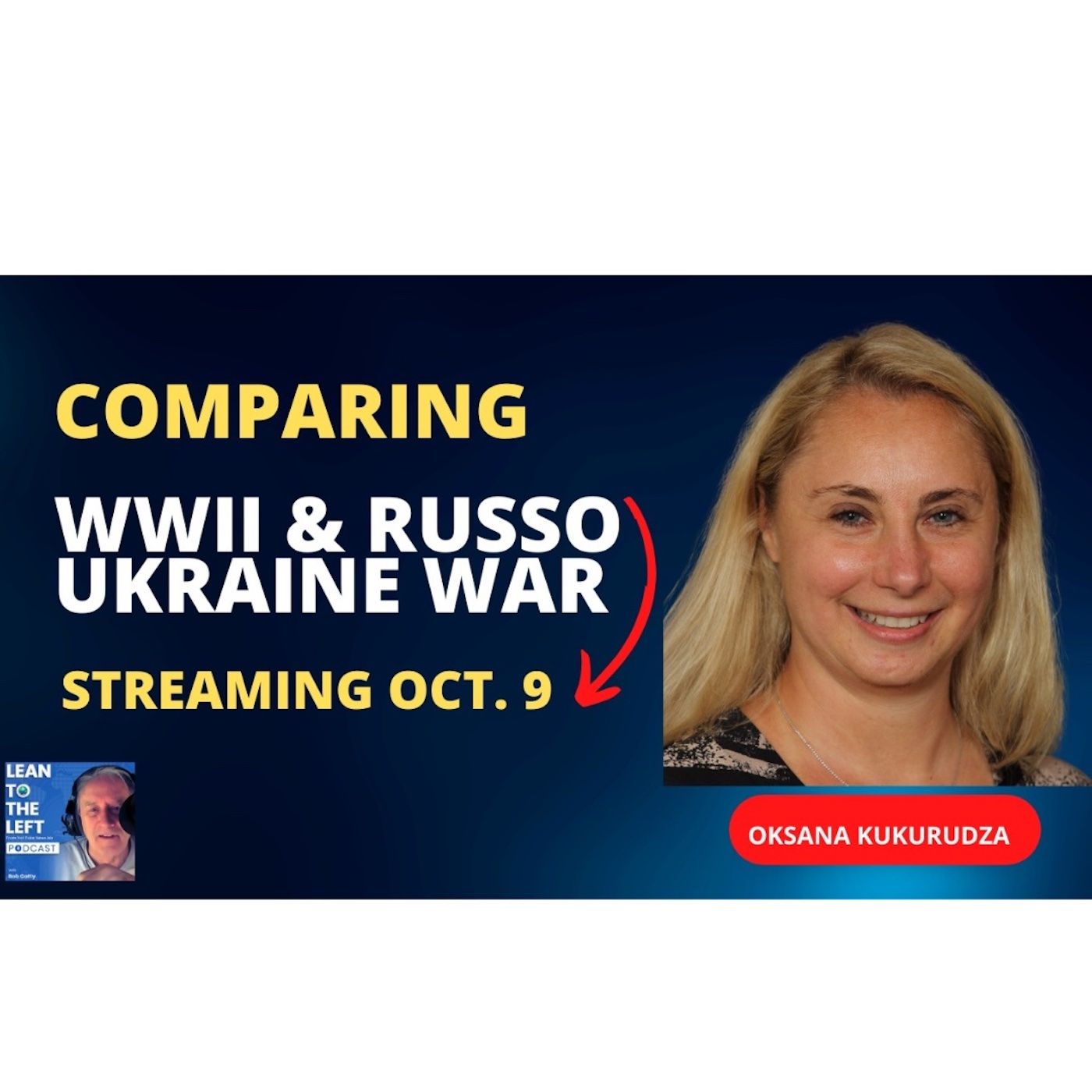Today on the Lean to the Left podcast we have a guest who will describe her parents’ experience in Nazi slave camps and who is writing a book drawing parallels between WWII and the Russo-Ukraine war today.
Oksana Kukurudza’s parents were in Nazi slave camps during WWII, then liberated by the U.S. Army, placed in refugee camps, and then finally settled in America where they raised their 12 children.
We’ll talk about the parallels between little known events of WWII to post-WWII Germany, including the 12 million Eastern European Nazi slaves, and the last million refugees --and how these events are eerily familiar to events in Ukraine.
Oksana Kukurudza, the American born daughter of Ukrainian immigrants, is an author and management consultant living in New York City. Since the events of February, 2022, she is writing a narrative non-fiction to shine a light on her parents' experience as slaves of the Third Reich and how today's Ukraine differs from the Ukraine she worked in for 18 months in 1996-97.
in this episode, Kukurudza discusses both the similarities between Hitler's actions in World War II as he enslaved Slavs and Vladimir Putin's actions today, including taking children from their Ukranian families and settling them with Russian families where they are indoctrinated to become Russian, as well as the atrocities that stem from Russia's bombing of civilian targets resulting in the death of innocent non-combatants, including women and children.
It's a piece of history that is little known and is related first-hand by this daughter of Ukranian parents who had been enslaved by the Nazis.
This show is part of the Spreaker Prime Network, if you are interested in advertising on this podcast, contact us at https://www.spreaker.com/show/4719048/advertisement
Show Notes
Don’t forget to follow Lean to the Left at podcast.leantotheleft.net, and you can reach me at bob@leantotheleft.net. You can also follow us on social media…Facebook at The Lean to the Left Podcast. Twitter at LeantotheLeft1. YouTube at Lean to the Left, Instagram at BobGatty_leantotheleft, and TikTok at Lean to the Left.
If you would take a minute to give us a review, that would be great. There are lots of podcast links on our webpage, podcast.leantotheleft.net, where you’ll also find our upcoming interview schedule and links to all of our podcasts.
I hope you’ll come back on a regular basis and check out our interviews with guests on topics that I hope you find interesting, entertaining, and enlightening.
Our interview shows stream weekly on Mondays, and depending on what’s going on, also on Thursdays, and most are produced as videos available on the Lean to the Left YouTube channel.
Also, let your friends know about this podcast and take a minute to subscribe yourself. Just go to podcast.leantotheleft.net to subscribe, check out the upcoming interview schedule, and listen to all of our episodes.
Remember, our goal is to be informative and entertaining as we comment on the latest developments in the news…you guessed it…with just a little lean to the left.
This show is part of the Spreaker Prime Network, if you are interested in advertising on this podcast, contact us at https://www.spreaker.com/show/4719048/advertisement
Show Transcript
Comparing WWII & Russo-Ukraine War
[00:00:00] Bob Gatty: House Speaker Kevin McCarthy's deal to prevent shutting down the government omitted a 6 billion request for aid to support Ukraine in its war with Russia. Today on the Lean to the Left podcast, we have a guest who will describe her parents experience in Nazi slave camps, and who's writing a book drawing parallels between World War II and the Russo Ukraine war today.
[00:00:28] So stay with us.
[00:00:29] Oksana Kukuruza's parents were in Nazi slave camps during World War II, then liberated by the U. S. Army, placed in refugee camps, and then finally settled in America, where they raised their, get this, 12 children. We'll talk about the parallels between little known events of World War II to post World War II Germany, including the 12 million Eastern European Nazi slaves and the last million refugees, and how these events are eerily familiar to events in Ukraine.
[00:01:07] Oksana Kukaruzha, the American born daughter of Ukrainian immigrants, is an author and management consultant living in New York City. Since the events of February 2022, she's writing a narrative non fiction to shine a light on her parents experience as slaves of the Third Reich, and how today's Ukraine differs from the Ukraine she worked in for 18 months in 1996 and 97.
[00:01:40] Oksana, thanks for joining us today on the Lean to the Left podcast.
[00:01:45] Oksana Kukurudza: Thanks so much, Bob, for having me. I appreciate it.
[00:01:48] Bob Gatty: This is a topic that I'm really interested in. This war with Ukraine that Russia started is just abominable. And Americans don't really realize, I think, in many cases, how it affects them, because it does.
[00:02:03] At any rate, there were some 12 million Eastern European, over 2 million Ukrainian, enslaved by the Nazis during World War II. I did not know that. And I know that people are unaware of that fact. So can you tell us about that?
[00:02:22] Oksana Kukurudza: Sure. I'm happy to speak about it. I've been doing quite a bit of my own extensive research on it because I agree with you.
[00:02:28] There's very little out there in English, out on the worldwide web, and you really have to dig for it. And it's one of the reasons that I'm writing this book is I just want to educate americans and educate the world on this little known fact that happened during World War Two.
[00:02:47] How it started was when Hitler and Stalin partitioned Poland in 1939, the Germans came in and they had their kind of master race theory. A lot of people know about their master race theory that they were, they saw different ethnicities on different prongs of hierarchy. The Aryan race being at the top, the West Germans next. And then everybody knows that the bottom of the ladder were the Jews, the Roma and the homosexuals that were slated for extermination.
[00:03:21] What a lot of people don't know is between the Western Europeans and the, those for extermination were the Slavs. So essentially Nazi Germany and Hitler decided that Slavs should be the slave race for the Nazis. And so when they took over Poland and Czechoslovakia in 1938 1939, they first started with propaganda.
[00:03:52] So posters, things like that to encourage, People and workers from the east to come west to work in Germany to work as agriculturalists to work and to work in industry. And then, as the war proceeded and Hitler invaded what was the eastern part of Poland that Stalin had taken over. He, the Nazis quickly moved into Western USSR, what used to be Eastern Poland, all the way to, pretty much the border of modern day Russia.
[00:04:25] So he invaded all the way through Ukraine and started using those same propaganda techniques to bring people over. And my mother was duped in November of 1941 with those posters to come to Germany because there were no jobs in her village. My father, however, I just found out he wasn't quite duped.
[00:04:46] He was just deported. So what the Nazis started to do, too, is word started spreading around That people weren't just being invited to Germany to work to do these great jobs for six months with good pay, but that the minute they came into Germany, their working papers were taken away from them, and they were essentially sold like there were I've even read that there were some slave auctions where in these filtration and transition camps, as you came through Germany as an Eastern worker, that, companies and farmers and things would line up and, pay the government, To then take these people to force them to work and take their papers away from them and not allow them to go home, not allow them to send money home.
[00:05:31] And so you ended up and as the war, as the war progressed, of course, the word got out and people didn't want to voluntarily go. And so they were just being kidnapped and deported to Germany to work. And as Germany was losing more and more of their men, they just kept taking more and more people to the point where they were taking even kind of young children to work in Germany.
[00:05:55] And so after the war, you had You know, these millions and millions of displaced people and it's a really even sadder story going forward and the in the post war era, because the allies all made this pact with each other that they would forcibly resettle people back to their origins. And so you had, people that were, liberated in Germany, but whose origins were, let's say, now the USSR, or now part of, communist Eastern Europe behind the Iron Block, and they were forcing them, forcibly forcing them to go home, even though these people felt like their lives could be at stake because they might be perceived as collaborating with the Nazis, having gone home.
[00:06:43] So it's really a disastrous. sad traumatic story that we don't talk about at all in the West.
[00:06:53] Bob Gatty: So these people were interned in camps and slave camps.
[00:06:59] Oksana Kukurudza: Yeah, they were treated many different ways. So my mother was interned in a slave camp. She worked in agriculture. And she supported a nearby bomb factory, the food supported a nearby bomb factory.
[00:07:13] And so she talked to me about what it was like, her slave camp, where there was barbed wire, there were SS guards, there were German shepherds. And I visited I visited the concentration camp. So I went to Auschwitz Birkenau and the way she described her camp didn't seem all that different.
[00:07:32] from what I saw when I was there. My father worked on a manor farm. He wasn't surrounded by guards. He had a little bit of a different experience. And then I've read about through my research that others maybe were placed with German families as nannies and cooks and maids or they might have been working in bomb factories.
[00:07:54] And if they worked in bomb factories, they could have been even in worse conditions because they were forced to work with chemicals that could be very dangerous to them and to their skin. And so there was a mixed bag on how the people were treated. But the majority, almost all of them really didn't get paid.
[00:08:14] And if they did get paid, Bob. Their earnings were taken for the meager food and clothing that they received from their employers. And you'll love this one. Some, the rest of their earnings were put into a future pension fund that they would've never received. . Oh man. It's really outlandish when you start reading some of these things and just imagining what these people went through.
[00:08:44] Bob Gatty: But there weren't exterminations like with the Jews, correct?
[00:08:48] Oksana Kukurudza: It wasn't mass extermination however, they were not very well treated, and, and I'm sure that they were shot if they tried to leave, or they were put into, I have read that they were put into concentration camps if they, weren't deemed working hard enough for maybe, napping on the job or stealing food.
[00:09:10] So it was still a very precarious situation as well as they weren't fed very well. So there were, high numbers of them that also perished through the system.
[00:09:23] Bob Gatty: So your mom and dad were separated.
[00:09:27] Oksana Kukurudza: They were not together at the time. So my mother was 17 when she left and went to Germany. And my father was 20.
[00:09:34] So they met later after the war in the displaced person camps. Oh, they have two very different experiences.
[00:09:42] Bob Gatty: I see. Okay. All right. But in the cases of a married couple, were they separated or were they kept together or don't you know?
[00:09:50] Oksana Kukurudza: I don't know. I would have to do some more research.
[00:09:54] Bob Gatty: When you're talking about your mom with this experience and your dad with that experience 17.
[00:09:59] And he was 20
[00:10:02] Oksana Kukurudza: and he was 20. Yes. And then during those experience, during the time that they were there, they experienced things like the allied bombings. They they experienced things like even before the war my mother's older brother they spent two years under the Soviet Union.
[00:10:21] And my mother tells me this story about how she lost her beloved older brother. He was like a father to her when the Soviets came through their village and just forcibly conscripted him and she never saw him again. I have a hypothesis that maybe he was sent to Finland to fight on the front lines because at the time there was a war going on between the USSR and Finland but yet, the war between Germany and the USSR hadn't started yet.
[00:10:52] But, in terms of the eerie, familiarities or similarities between, my parents events and today's in Ukraine, I just see things like the Russians are using minorities as cannon fodder for the front line, which is very much what they did back in World War Two and what I believe happened to my oldest uncle. The internment camps that we saw in Germany during World War II. We know that there are filtration camps that the Russians have set up in occupied Ukraine, and we don't know what's happening to the people that might be deemed as traitors, or questionable by the Russians. Perhaps, they're sending them to some sort of camps.
[00:11:38] And then other things that are, very familiar are the bombs, the way that the, allies and Axis powers bombed civilians to smithereens , we're seeing the same things happening in Ukraine much more on the Russian to Ukraine side, right? Where. It's, weekly we hear about a bombing that kills civilians, killing children.
[00:12:03] The other things that are too familiar is just the number of refugees. We had millions of refugees in Europe after World War II, and we have six million refugee, Ukrainian refugees, sitting in Europe at the moment. And then the last kind of familiar thing is the Nazis were known for taking little children that were either Slavic or Jewish that looked Aryan, blonde hair, blue eyed and putting them into stealing them and putting them into German households and reprogramming them. And that's another part of the playbook that Russia's plan doing today by taking Ukrainian children away from the occupied territories and placing them with Russian families and training them, teaching them that they're now Russian and not Ukrainian.
[00:12:50] Bob Gatty: Incredible, taking them away from their parents, right?
[00:12:54] Oksana Kukurudza: Yes, it's as if Vladimir Putin just, opened up the Nazi Adolf Hitler playbook and he's just, playing it play for play. And it's really sickening and disheartening. And that's why I know I've been very passionate the past couple of weeks with what's been happening with the House of Representatives and choosing whether or not they're going to continue to fund Ukraine going forward.
[00:13:19] Bob Gatty: Yeah, what do you think about all of that?
[00:13:22] Oksana Kukurudza: I have a lot of thoughts about that. In fact, I'm joining an organization called Razum for Ukraine in a couple of weeks to go down and do some lobbying with my own representatives.
[00:13:34] Bob Gatty: Yeah, okay.
[00:13:36] Oksana Kukurudza: And if you want my perspective on why I believe that we should continue to fund Ukraine, I'm happy to provide those if you're interested.
[00:13:45] Bob Gatty: Of course, I want to do that. Yeah, sure. I also want to I want to hear what you were doing. You were working in Ukraine. In the mid 1990s. I want you to tell me about that. But since you brought it up, let's talk about the Congress and their failure to pass that 6 billion aid request in the deal that McCarthy reached to prevent a government shutdown.
[00:14:12] Let's talk about that. What are the implications of the fact that they're not going to provide that unless Biden figures out a way to do it? He's trying to, get around to
[00:14:24] Oksana Kukurudza: squeeze blood from a stone. Yeah, I'm still hopeful that there are enough Republicans that something will pass, but if it doesn't pass, there are a number of implications.
[00:14:34] So the first one is there's six million Ukrainian refugees in Europe and right now the majority of Europe is, has that burden to bear. If Ukraine doesn't win this war, those people are never going to go home because they're never going to feel safe in a Ukraine at war or a Ukraine occupied by Russia.
[00:14:57] And eventually Europe is going to be looking to the United States to financially help support those refugees or, and take many of those refugees ourselves. So it will end up being costly on us. Yeah, so it's going to cost more money on us, I believe, to not continue to fund Ukraine than what it's doing to fund Ukraine today.
[00:15:23] Secondly, Ukraine is an ally of ours. As well as we have many allies in Europe as a part of NATO that look to us to help with their security. And the little aid I feel that we're giving Ukraine, and we don't have men on the ground, or soldiers on the ground. Ukraine is doing a lot to erode the Russian military capability.
[00:15:49] That is in the interest of the United States as a NATO member. Because... If Russia is successful in Ukraine, I 100 percent believe that they will continue and they're going to go after the Baltics because he wants to reconstitute the USSR and that will be his next step. And then it could be Poland. So eventually we're going to end up having boots on the ground later on if we don't continue to financially and militarily support Ukraine today. And then lastly, I would say a couple of last leads would be if we continue to not support our allies. Our allies are going to stop trusting us, and if we don't support Ukraine, China's watching, and China will invade Taiwan, and then we'll have to be even more involved in Taiwan.
[00:16:38] So I see Ukraine as a deterrent to China's eyes or ambitions onto Taiwan. Okay. And lastly, I just think, we're supposed to be this shining city on the hill that supports democracies and how can we not support a democracy like Ukraine.
[00:17:00] Bob Gatty: Yeah, I would tell the would be immigrants from south of the border about the shining democracy on the hill.
[00:17:09] That's why they're coming. Yeah, that's right. That's why they're coming. And the and the conservative Republicans have certainly trying to do whatever they can to stop it.
[00:17:22] Oksana Kukurudza: Yeah I would argue if we helped Central and South America with their problems and helped them with their economies and help them with their crime, then people wouldn't come.
[00:17:38] People are coming because they have no opportunity at home. It's not because they just want to come to the United States. It's hard to be a refugee. Nobody does that when they have a really good life at home. So I always say start at the origin if you want to fix a problem. And it's the same with the Ukraine crisis.
[00:17:59] Make their home safe. And they will go home.
[00:18:03] Bob Gatty: Tell us a little bit about your experience working there back in the 1990s.
[00:18:09] Oksana Kukurudza: Sure. So it was it was very interesting for me as a Ukrainian American who had never lived there. My parents had family in the western part of Ukraine, and they were separated from their families.
[00:18:22] By 50 years because of the Iron Curtain. And so my mother had gone once to Ukraine before I showed up for work. And I did because I was working for an auditing company called Deloitte and Touche International. And there was this opportunity for me to go over there and work. And so I chose to do that.
[00:18:46] And I moved to Kiev. And the first thing I noticed was it is really cold there, and winters are horrible. I showed up in January, and I couldn't believe how cold it was, and it made me completely understand why both Napoleon and Hitler couldn't manage to invade and retain Europe. countries like Ukraine and Russia.
[00:19:07] It's, those are really rough winters. But the other thing that really struck me was culturally everyone in Ukraine, even though it was in the mid 90s, regardless of what language they spoke. So More people in the West spoke Ukrainian when you got to Kiev, it was like 50, 50 Ukrainian, 50 percent Russian.
[00:19:25] And then as you moved more east, it was much more Russian speaking, almost predominantly Russian speaking. But everyone said they were Ukrainian, unless they were like 100 percent ethnic Russian, and then maybe they would say they were Russian. But everyone had that identity of I'm Ukrainian, I'm not Russian, even if I speak Russian.
[00:19:44] So I thought That was interesting. The other thing that was interesting was just the dichotomy between the young and the old. So the old older generation and the pensioners, they were very disappointed and I would say, devastated by the loss of the safety net that they had with the U S R, and they were more than likely the ones that kind of wanted to go back.
[00:20:09] But the majority of the young people, like the people that you know, I worked with or I came into touch with, they looked westward. They wanted to be integrated into the west. They wanted to develop a capitalist democratic society in Ukraine, and they were just full of optimism. And there was a lot of poverty there, but there was a lot of optimism when I was there.
[00:20:36] Bob Gatty: All right. And so what do you do today in your work?
[00:20:44] Oksana Kukurudza: Sure. So I work for a company called Accenture, which is one of the largest consulting technology and operations outsourcing companies in the world. And we have over 700, 000 people. And I've been working with them now for about 21 years. I'm a managing director.
[00:21:03] So I'm one of their leaders. And I work specifically in an area consulting area where we consult to the finance function or the function underneath the CFO, and it's just really around transformation. So helping them to improve their processes and their systems.
[00:21:23] Bob Gatty: Okay, Accenture that used to be Arthur Anderson and company.
[00:21:27] Oksana Kukurudza: Yeah, but it used to be Anderson Consulting. Yep.
[00:21:30] Bob Gatty: Consulting, right? All right. So when do you're writing a book? What's your book called?
[00:21:37] Oksana Kukurudza: Sure. The book is called Sunflowers Bend But Rarely Break. Okay. And your listeners can download the first chapter of the book at https:// sunflowersrarelybreak. com. And the reason I named the book that is not only are sunflowers the national flower of Ukraine, But they're very hardy and resilient flowers, and they produce sunflower seeds that make sunflower oil, which is actually the largest export, agricultural export for Ukraine. But it also symbolizes sunflowers, hardy and resilient, and they bend towards the sun, they love the sun, and they'll even bend really as hard as they can to find the sun, even on dark days.
[00:22:29] And so the symbolism there is with my parents having to bend during their time period as Nazi slaves, their time period as refugees, but they never gave up hope that they would find the sun like a sunflower. And I feel the same way about the nation of Ukraine.
[00:22:50] Bob Gatty: That's beautiful. That really is beautiful.
[00:22:53] Now, your parents came to this country, what, when did they come to this country?
[00:22:58] Oksana Kukurudza: They arrived in 1956, October,
[00:23:01] Bob Gatty: 1956,
[00:23:03] 1956, and when did they start having all these kids
[00:23:08] Oksana Kukurudza: before then. Yeah. So there were six children born in Germany. And they were, the children were displaced persons too. They had no country of origin because even though you were born in Germany at that time the laws are different now, but back then you had to have German blood to become a German citizen, or you had to wait until you were old enough to take the tests and become naturalized. And so they were all, six of them, displaced people, no, no country of origin or children, I should say, my parents as well.
[00:23:42] And they came over with a sponsor and of course sponsored by the US government. And then they had six more. In Rochester, New York, and I was number 12,
[00:23:52] Bob Gatty: I was going to say you're probably the youngest. They would be really proud of what you're doing with your book and staying on top of this issue.
[00:24:00] I'm sure, right?
[00:24:01] Oksana Kukurudza: I think they would be. Yeah, they would be very proud. They were very proud of me. They were alive when I went to Ukraine and worked and they were incredibly proud. They would tell anyone and everyone they could that I was working in Ukraine, especially within their local Ukrainian community.
[00:24:17] Bob Gatty: Okay, all when are you gonna have this book done?
[00:24:21] Oksana Kukurudza: I'm working on finding an agent and a publisher. So I have the first draft done. I have been doing a little bit more research and finding some things that I want to tweak and change about the book. So I'm hoping to have it adjusted by the end of this year.
[00:24:37] And then, depending on if I am going to try to find a traditional publisher, because I really Okay. Okay. Want to get as many reads and eyeballs as I can because, one for the education very new topic that many people don't know about. And then secondly, because I want to use a lot of the proceeds from the book to support support charitable organizations that are helping either the Ukrainian refugee crisis today or for future reconstruction of the country once they win this war, and then they're free from the Russian yoke. And and I also have potentially a media company interested and shopping it to do a visual medium because I think something like this, too, could make for a really good film or TV series.
[00:25:28] Bob Gatty: Yeah, it sounds like it would. It's been a pleasure having you on the podcast today. Is there anything else you'd like to add before we sign off
[00:25:37] Oksana Kukurudza: just to your readers? I know that there's a group on the way left side as you lean to the left to maybe are doves and don't want to support Ukraine.
[00:25:49] I would tell them that there's massacres happening and we need to stop it. And unfortunately, sometimes you need war to settle things and to get to peace. And so I just ask all of your reader, all of your listeners. And read a little bit more about Ukraine and its beautiful history and culture and read a little bit more about what's going on now in the country, because I believe that this is really a fight worth backing, and I really want the U. S. to continue to financially and militarily support Ukraine, and they won't do it without all of us telling our government to do it.
[00:26:27] Bob Gatty: Okay, excellent. Thank you very much, Oksana. It's been a pleasure.
[00:26:32] Oksana Kukurudza: Thank you. Thanks for having me.
Listen On
Also In Season 3
-

Riding the Rails to Victory
In 1836, William Henry Harrison was the first presidential candidate to campaign -

Has There Been Progress on Racism Since the Montgomery Bus Boycott?
It was 73 years ago in 1950 that a Black man named Hillard Brooks was shot and k -

Dixie Dems: The Wacky GOP & Their Dictator
Despite the fact that Donald Trump is facing multiple court cases, including cri -

Amanda Kessler-A Progressive's Take on Ethics & Equality
Welcome to the Lean to the Left podcast, where we explore progressive politics a


Comments & Upvotes